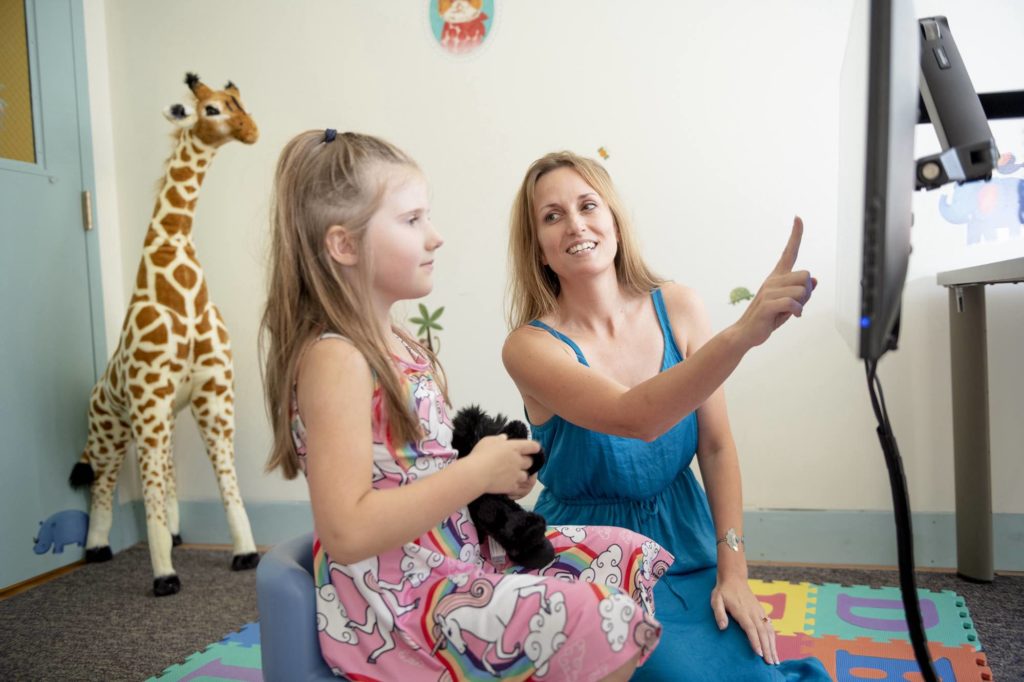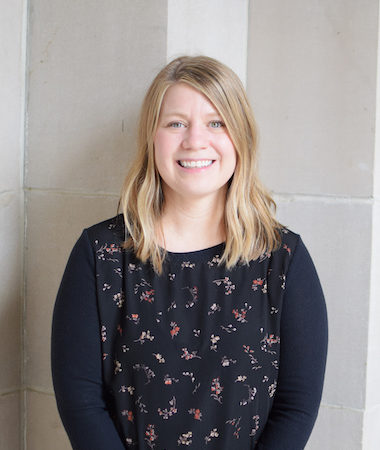Four Scholars Pursue Diverse Research Through Cattell Sabbatical Awards

Photo above: Neuroscientist Jessica Cantlon, one of four 2022–2023 James McKeen Cattell Fund Fellowship recipients, explains a math game to a participant. Photo credit: Carnegie Mellon University
The James McKeen Cattell Fund has recognized psychological scientists APS Fellow Kenneth Bollen, APS Fellow Jessica Cantlon, Kevin Myers, and APS Fellow Kristin Shutts as recipients of its Sabbatical Fund Fellowship for 2022–2023. Administered through the James McKeen Cattell Fund at Duke University, these awards (distinct from the APS James McKeen Cattell Fellow Award) help recipients pursue new research by supplementing the regular sabbatical allowance provided by their home institutions so they can extend their leave time from one to two semesters.
Learn more about the James McKeen Cattell Fund, including past sabbatical awardees and how to apply for the 2023–2024 award (application deadline January 15, 2023). Read about the 2021 sabbatical awardees.
Here are the recipients of the 2022–2023 James McKeen Cattell Fund Fellowship:

Kenneth Bollen
University of North Carolina
APS Fellow Kenneth Bollen is the H. W. Immerwahr Distinguished Professor of Psychology & Neuroscience at the University of North Carolina, Chapel Hill. His primary areas of statistical research are in structural equation models, longitudinal methods, and latent growth curve models.
“Nothing is more fundamental to science and more difficult to establish than causality,” he wrote in his application. “Even the gold standard of randomized experiments is not immune to confounders. Observational studies are even more challenging. Yet despite these obstacles, causal inference methods have advanced.” The goal of his project is to break down the barriers separating three predominant causal inference methods in the social, behavioral, and health sciences: Structural Equation Models (SEMs), Directed Acyclic Graphs (DAGs), and the Counterfactual Framework (CF). More specifically, his goals are to describe the methods’ historical and philosophical connections and identify points of commonality and divergence, to develop a unifying framework that incorporates them all, and “to do so with methods most relevant to psychologists. Because causal inference is relevant to all fields of psychology, the potential for psychological applications is vast.”

Jessica Cantlon
Carnegie Mellon University
APS Fellow Jessica Cantlon is an associate professor of psychology at Carnegie Mellon University. She uses behavioral and neuroimaging methods to study the origins of quantitative reasoning in human adults, children, and non-human primates.
“Children often struggle with complex forms of reasoning, particularly with logical rules that have multiple relations such as hierarchical rules,” she wrote in her application. She intends to use her sabbatical to expand her laboratory’s research, which studies the origins of mathematical reasoning in humans, in three new directions: “developing longitudinal cross-cultural research on logical reasoning, building a new AI-driven public laboratory for testing primate cognition, and designing educational interventions for girls in science, technology, engineering, and medicine (STEM).” Her sabbatical year will include strengthening her interdisciplinary research program by creating new projects on cross-cultural longitudinal data collection in Bolivia, building a new research laboratory for primate cognition studies, and conducting STEM education research with children.

Kevin Myers
Bucknell University
Kevin Myers is a professor of psychology and member of the neuroscience and animal behavior programs at Bucknell University. His research uses rodent models to study appetite and food reward, especially how the taste and nutrient content of foods influence eating patterns, and how aspects of the modern food environment affect the brain and behavior. His newest work is concerned with the impacts of food insecurity.
“I will spend the academic year at the University of Southern California, in the research group of Dr. Scott Kanoski,” Myers explained. “We will be looking at hippocampal and brainstem circuits involved in food seeking that may mediate the disruptive behavioral impacts of unpredictable food access in rats.” This will extend his ongoing work aimed at developing a rodent model of food insecurity, which has significant adverse effects on health and well-being in humans, including dysregulation of food motivation, cognitive and emotional disturbance, and proneness to obesity. “A year-long sabbatical will be advantageous for developing hands-on expertise with neuroscience methods that will extend this model and also expand my capabilities for future undergraduate research mentorship and teaching,” he added.

Kristin Shutts
University of Wisconsin–Madison
APS Fellow Kristin Shutts is a professor of psychology at the University of Wisconsin–Madison. Her research investigates the origins and development of young children’s social categorization abilities and intergroup biases.
“Most recently, I have turned my attention to creating and testing theoretically motivated interventions to reduce children’s racial biases,” she wrote on her application. “During my sabbatical, I plan to accomplish two goals: (1) Produce a review paper that highlights best practices, and identifies needed future research, regarding how to measure children’s racial biases; (2) Develop materials to help children practice key bias-reducing strategies and test the effects of such materials on children’s racial biases. … Funding from a Cattell Sabbatical Award would allow me to achieve both of my goals, catapult the next phase of my research program, and support the production of important knowledge and tools for the field and for society more broadly.”
Learn more about the James McKeen Cattell Fund.
Feedback on this article? Email apsobserver@psychologicalscience.org or login to comment. Interested in writing for us? Read our contributor guidelines.





APS regularly opens certain online articles for discussion on our website. Effective February 2021, you must be a logged-in APS member to post comments. By posting a comment, you agree to our Community Guidelines and the display of your profile information, including your name and affiliation. Any opinions, findings, conclusions, or recommendations present in article comments are those of the writers and do not necessarily reflect the views of APS or the article’s author. For more information, please see our Community Guidelines.
Please login with your APS account to comment.